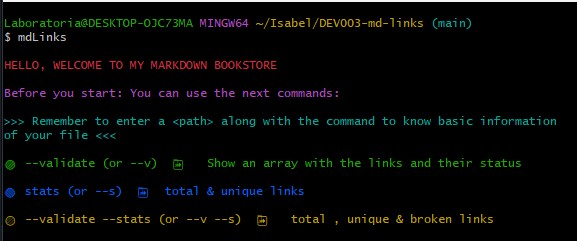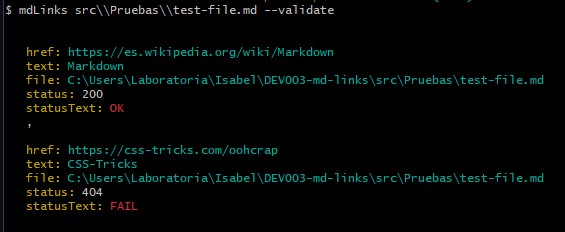isabelroman-mdlinks
v0.1.0
Published
Permite buscar y analizar links en archivos markdown
Downloads
10
Maintainers
Readme
Markdown Links
Índice
- 1. Sobre MD-Links
- 2. Resumen del proyecto
- 3. Instalación
- 4. Instrucciones de Uso
- 5. Objetivos de aprendizaje
- 6. Autora
1. Sobre MD-Links
Markdown es un lenguaje de marcado ligero muy popular entre developers. Es usado en muchísimas plataformas que manejan texto plano (GitHub, foros, blogs, etc.) y es muy común encontrar varios archivos en ese formato en cualquier tipo de repositorio (empezando por el tradicional README.md).
Estos archivos Markdown normalmente contienen links (vínculos/ligas) que muchas veces están rotos o ya no son válidos y eso afecta el valor de la información que se quiere compartir.
2. Resumen del proyecto
Dentro de una comunidad de código abierto, nos han propuesto crear una herramienta, usando Node.js, que lea y analice archivos en formato Markdown, para verificar el estatus de los links que contengan y reportar algunas estadísticas.
Para ello se crea una herramienta de línea de comando (CLI) con su correspondiente librería (o biblioteca - library) en JavaScript.
Cabe resaltar que diseñar una librería es una experiencia fundamental para cualquier desarrollador porque que lo obliga a pensar en la interfaz (API) de los módulos y cómo será usado por otros developers. Se debe tener especial consideración en peculiaridades del lenguaje, convenciones y buenas prácticas.
- Diagrama MD-Links
3. Instalación
Puedes instalar la librería a través de npm:
npm i isabelroman-mdlinks
Para acceder se debe importar con require('isabelroman-mdlinks')
4. Instrucciones de Uso
Para comenzar con la ejecución del programa:
mdLinks
Posteriormente ingrese la ruta del archivo.md en el cual quiere verificar el estado de los links. Si no agrega ningún comando, arrojará los links disponibles en el archivo sin ninguna validación ni estadística.
mdLinks <path>
Para conocer el status de los links:
mdLinks <path> --validate
Para conocer el total de links que tiene el archivo y, además, cuantos son únicos:
mdLinks <path> --stats
Para conocer el total de estadísticas disponibles:
mdLinks <path> --validate --stats o mdLinks <path> --stats --validate
5. Objetivos de aprendizaje
JavaScript
[X] Diferenciar entre tipos de datos primitivos y no primitivos
[X] Arrays (arreglos)
[X] Objetos (key, value)
[X] Uso de condicionales (if-else, switch, operador ternario, lógica booleana)
[X] Funciones (params, args, return)
[ ] Recursión o recursividad
[X] Módulos de CommonJS
[X] Diferenciar entre expresiones (expressions) y sentencias (statements)
[X] Callbacks
[X] Promesas
[X] Pruebas unitarias (unit tests)
[X] Pruebas asíncronas
[X] Uso de mocks y espías
[ ] Pruebas de compatibilidad en múltiples entornos de ejecución
[X] Uso de linter (ESLINT)
[X] Uso de identificadores descriptivos (Nomenclatura y Semántica)
Node.js
[X] Instalar y usar módulos con npm
[X] Configuración de package.json
[X] Configuración de npm-scripts
[X] process (env, argv, stdin-stdout-stderr, exit-code)
[X] File system (fs, path)
Control de Versiones (Git y GitHub)
[X] Git: Instalación y configuración
[X] Git: Control de versiones con git (init, clone, add, commit, status, push, pull, remote)
[X] Git: Integración de cambios entre ramas (branch, checkout, fetch, merge, reset, rebase, tag)
[X] GitHub: Creación de cuenta y repos, configuración de llaves SSH
[X] GitHub: Colaboración en Github (branches | forks | pull requests | code review | tags)
[X] GitHub: Organización en Github (projects | issues | labels | milestones | releases)
HTTP
[X] Consulta o petición (request) y respuesta (response).
[X] Códigos de status de HTTP
6. Autora
Isabel Cristina Román Ospina









